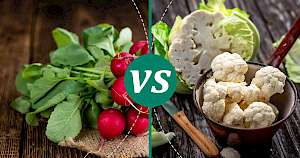Cauliflower vs Radish: Nutrition & Calories Compare


Cauliflower vs Radish
Nutrition Facts
Serving size:
change
5g10g15g20g30g40g50g60g80g100g120g140g160g180g200g220g250g300g350g400g450g500g600g700g800g900g1000g
1oz2oz3oz4oz5oz6oz7oz8oz10oz12oz15oz20oz25oz30oz35oz40oz50oz
Amount Per Serving:
Serving size:
change
5g10g15g20g30g40g50g60g80g100g120g140g160g180g200g220g250g300g350g400g450g500g600g700g800g900g1000g
1oz2oz3oz4oz5oz6oz7oz8oz10oz12oz15oz20oz25oz30oz35oz40oz50oz
Amount Per Serving:
Cauliflower vs Radish 100g Compare
| per 100g | Cauliflower | Radish |
|---|---|---|
| Calories | 25 | 16 |
| Carbohydrates | 4.97 g | 3.4 g |
| Fat | 0.28 g | 0.1 g |
| Dietary fiber | 2 g | 1.6 g |
| Protein | 1.92 g | 0.68 g |
| Calcium | 22 mg | 25 mg |
| Iron | 0.42 mg | 0.34 mg |
| Magnessium | 15 mg | 10 mg |
| Potassium | 299 mg | 233 mg |
| Sodium | 30 mg | 39 mg |
| Zink | 0.27 mg | 0.28 mg |
| Vitaminium B2 (riboflavin) | 0.06 mg | 0.039 mg |
| Vitaminium B3 (Niacin) | 0.507 mg | 0.254 mg |
| Vitaminium B6 | 0.184 mg | 0.071 mg |
| Vitaminium B9 (Folic acid) | 57 mg | 25 mg |
| Vitaminium C | 48.2 mg | 14.8 mg |
| Vitaminium K | 15.5 µg | 1.3 µg |
A Fresh Look at Cauliflower and Radish
When it comes to choosing vegetables for a healthy diet, both cauliflower and radish offer unique flavors and nutritional profiles that make them stand out in the produce aisle. These vegetables are not only versatile in the kitchen but also come packed with a variety of vitamins and minerals that contribute to overall health. Before we dive into the nutritional comparison, let's explore some interesting facts about these two vegetables that might surprise you.
Interesting Facts to Pique Your Curiosity
Cauliflower is not just white; it comes in a variety of colors including purple, green, and orange. Each color variant has its unique antioxidant profile, with the orange variety being rich in beta-carotene and the purple kind boasting anthocyanins. Meanwhile, radish, known for its peppery flavor, has been used not just as a food but also medicinally throughout history. In ancient times, radishes were so valued that they were offered as payment to the ancient Egyptian laborers who built the pyramids.
Nutritional Insights: Cauliflower vs. Radish
When it comes to nutrition, both cauliflower and radish are low in calories, making them excellent choices for anyone looking to maintain or lose weight. Specifically, cauliflower has 25 calories per 100 grams, while radish has even fewer, with just 16 calories. This makes radish a slightly better option for calorie-conscious individuals.
In terms of macronutrients, cauliflower contains more carbohydrates (4.97g) and protein (1.92g) compared to radish, which has 3.4g of carbohydrates and 0.68g of protein. Both vegetables are low in fat but rich in dietary fiber, essential for healthy digestion. Cauliflower provides 2g of fiber, whereas radish offers 1.6g.
Looking at the micronutrients, both vegetables contribute beneficial minerals and vitamins to your diet. Cauliflower is an excellent source of vitamin C, with 48.2mg, and also provides a good amount of vitamin K and folate (vitamin B9). On the other hand, radish stands out for its calcium and vitamin B6 content. It's also worth noting that radish contains a small amount of vitamin A, which is absent in cauliflower.
Both are free from cholesterol and gluten, making them suitable for various dietary needs. They also contain essential minerals like potassium, magnesium, and iron, albeit in modest amounts.
Which One to Choose?
Ultimately, the choice between cauliflower and radish comes down to personal preference and dietary goals. If you're looking for a vegetable that's higher in protein and vitamin C, cauliflower might be the way to go. On the other hand, for those watching their calorie intake closely, radish offers a lower-calorie option with a unique peppery taste.
Both vegetables are incredibly versatile and can be enjoyed raw, roasted, steamed, or added to a variety of dishes. Whether you're making a crunchy salad, a comforting soup, or a colorful stir-fry, incorporating cauliflower and radish can add nutritional value and flavor to your meals.
In conclusion, both cauliflower and radish offer compelling nutritional benefits and can be healthy additions to your diet. By understanding their nutritional profiles, you can make informed choices that align with your health and wellness goals. So, the next time you're at the grocery store, why not pick up both and enjoy the best of what these nutritious vegetables have to offer?
Cauliflower 100g
25kcalCalories source
- 66% CARBS.
- 26% PROTEIN
- 8% FAT
Radish 100g
16kcalCalories source
- 79% CARBS
- 16% PROTEIN
- 5% FAT
Compares of cauliflower
- Cauliflower vs Artichoke
- Cauliflower vs Arugula
- Cauliflower vs Asparagus
- Cauliflower vs Beetroot
- Cauliflower vs Bitter Melon
- Cauliflower vs Bok Choy
- see all compares of cauliflower
Marcin Piotrowicz
calories-info.com creator
Healthy diet and healthy lifestyle promoter
Add comment